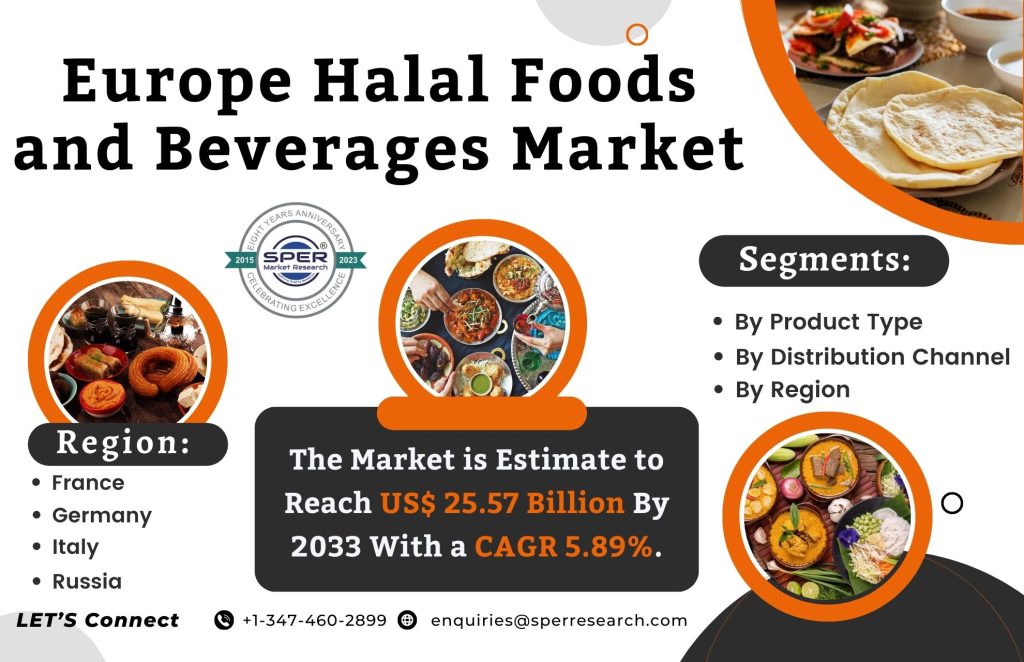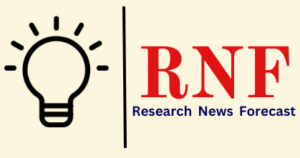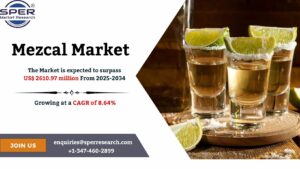Europe Halal Foods and Beverages Market Trends 2024- Industry Share, Revenue, Growth Drivers, Business Challenges and Future Opportunities till 2033: SPER Market Research

The Arabic term “halal” means “permissible” in English. The terms haram (‘forbidden’) and halal are contrasted throughout the Quran. Although the term “halal” refers to much more than simply Islamic dietary customs, it is most commonly associated with food, beverages, and other goods. The preparation and consumption of halal food has significant religious implications for members of the Islamic community. In the near future, halal food is becoming more and more well-liked by both Muslim and non-Muslim customers as it has developed from a religious symbol to guarantee the hygienic and safety of food and drink items.
According to SPER market research, ‘Europe Halal Foods and Beverages Market Size – By Product Type, By Distribution Channel – Regional Outlook, Competitive Strategies and Segment Forecast to 2033’ state that the Europe Halal Foods and Beverages Market is predicted to reach USD 25.57 billion by 2033 with CAGR of 5.89%.
In restaurants and grocery stores around the United Kingdom, the availability of halal food is growing. The country’s growing Muslim population and the growing interest of non-Muslim consumers are the reasons behind this trend. An impressive surge in halal goods sales is anticipated in response to this growing demand, based on thorough evaluations. Additionally, the country’s awareness of halal certification has grown significantly, which is significantly contributing to the market’s expansion. The producers have been attempting to alter every step of the value chain, from the development of new products and raw materials to the packaging and marketing of completed goods and the social media campaigns used to raise consumer knowledge of the advantages of use.
Similar to any other industry, the European halal food and beverage market has several challenges that could impede its growth. Economic conditions, consumer preferences, legal frameworks, and cultural diversity are some of the factors contributing to these challenges. Europe has a diverse halal market, which reflects regional differences in Muslim groups’ tastes. One of the most significant obstacles is the ignorance of non-Muslim customers regarding halal requirements. Acquiring and maintaining halal certification may prove to be challenging. Adapting products to meet the diverse cultural preferences of the European Muslim minority can be challenging. Halal items are challenging to integrate into traditional retail stores and distribution networks.
Request For Free Sample Report @ https://www.sperresearch.com/report-store/europe-halal-foods-and-beverages-market.aspx?sample=1
Impact of COVID-19 on Europe Halal Foods and Beverages Market
There was a little decline in the global halal food and beverage market during the COVID-19 pandemic. International supply networks were disrupted by the epidemic, which affected the distribution and sourcing of food, particularly halal food. Lockdowns, restrictions, and transit problems were some of the reasons for these interruptions. The sharp decline in the consumption of red meat also affected halal meat. However, the companies focused on creating new products in order to draw consumers back into the market. The pandemic accelerated the growth of e-commerce, particularly websites selling Halal food and beverages. Transparency and trust were given more importance; for example, customers looking for reassurance regarding the authenticity of Halal items found that clear labeling and halal certification were critically crucial.
Europe Halal Foods and Beverages Market Key Players
France is home to a sizable Muslim population in Europe. The halal options have also evolved, from the customary neighbourhood butcher who offered meat that was slaughtered in accordance with Islamic law to a prominent role in French food companies, supermarkets, and dining establishments. Italy has a developing and dispersed halal food business despite being the third-largest economy in Europe. Additionally, some of the market key players are Ferrero International SA, JAB Holding Company, KQF Foods, Nestle SA, Al Islami Foods, Tahira Foods Limited, Tariq Halal Meats and various others.
Europe Halal Foods and Beverages Market Segmentation:
The SPER Market Research report seeks to give market dynamics, demand, and supply forecast for the years up to 2033. This report contains statistics on product type segment growth estimates and forecasts.
By Product Type: Based on the Product Type, Europe Halal Foods and Beverages Market is segmented as; Halal Food, Halal Beverages, and Halal Supplements.
By Distribution Channel: Based on the Distribution Channel, Europe Halal Foods and Beverages Market is segmented as; Hypermarkets/Supermarkets, Specialty Stores, Convenience Stores, and Other Distribution Channels.
By Region: This research also includes data for France, Germany, Italy, Russia, Spain, United Kingdom, and Rest of Europe.
This study also encompasses various drivers and restraining factors of this market for the forecast period. Various growth opportunities are also discussed in the report.
For More Information, refer to below link:-
Europe Halal Foods and Beverages Market Revenue
Related Reports:
Follow Us –
LinkedIn | Instagram | Facebook | Twitter
Contact Us:
Sara Lopes, Business Consultant – U.S.A.
SPER Market Research
+1-347-460-2899





